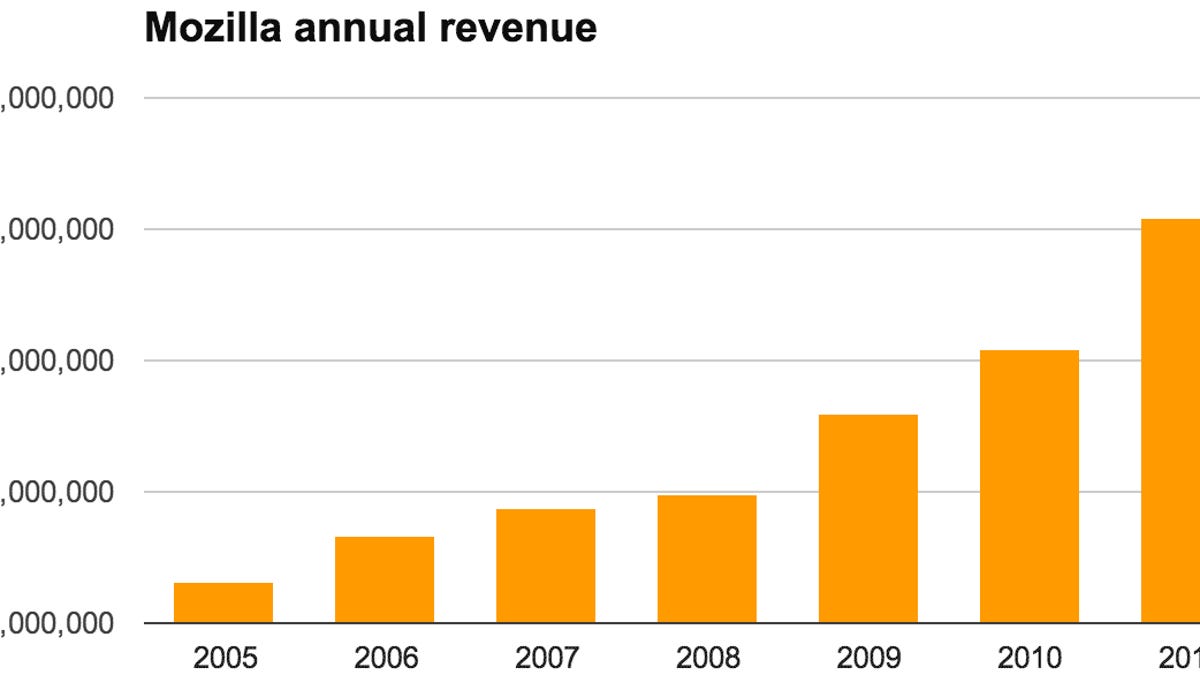Mozilla: The problem is mobile, not money
The organization generated $163.5 million in 2011, mostly from searches performed with Firefox. But it still lacks a strong foothold the world of smartphones and tablets.

With more than 400 million Firefox users, Mozilla doesn't have a problem with relevance. And with today's disclosure that organization's revenue grew 33 percent to $163.5 million in 2011, the nonprofit organization doesn't have a problem with money.
But it does have a problem with mobile.
So concludes Mitchell Baker, leader of the organization behind the open-source Web browser and other projects designed to keep the Internet free from proprietary constraints. Firefox, which just celebrated its eighth birthday, is the main lever that Mozilla uses to try to keep the Internet open. But Firefox is largely absent from the explosive growth in the mobile world of smartphones and tablets.
"The current state of the mobile ecosystem concerns us the most," said Mitchell Baker, who has led Mozilla since it was spun out of the Netscape browser project. Mozilla can't bring its full browser technology to iOS, Windows Phone, and Windows RT, and people do things with native apps on mobile device that they might do with a Web browser on a PC.
"The stage we're in with mobile devices -- with different hardware, software, and user experience -- is much more closed. It's lacking many of the freedoms of the Web," Baker said. "In the mobile space, we have less impact, and more computing time is moving in that direction."
The bulk of Mozilla's funds come from search-ad revenue shared by partners including Google, Bing, Yahoo, Yandex, Amazon, and eBay. "Most of that is from Google," Baker said. When a search using Firefox's search box produces search-ad revenue on one of those partners' sites, they share a portion of the revenue with Mozilla.
When Mozilla renewed its search deal with Google in December for another three years, it switched searches in Russian-language versions of Firefox from the Russian search engine Yandex to Google. Yandex remains an option users can pick though, as is Microsoft's Bing.
Even though Mozilla's revenue increased 33 percent from 2010 to 2011, hiring and other costs pushed up expenses, too, according to Mozilla's tax-related financial statements and annual report released today. The 2010 expenses of $87.3 million rose to $145.5 million in 2011. That means net cash flow from operations dropped from $21.7 million to $13.4 million.
Mobile challenges
Naturally, Mozilla is working on getting a foothold in the mobile market. In 2012, it rebuilt Firefox for Android to take advantage of the native interface abilities of Google's operating system. And in early 2013 -- later than originally hoped -- it will release Firefox OS, a mobile operating system that runs Web apps.
Three years ago, when Google announced its conceptually similar browser-based operating system, Chrome OS, Baker showed no interest in a Firefox-based equivalent. Mozilla still isn't aiming for PCs, but with much of the mobile world walled off, it concluded a browser-based OS was appropriate for the mobile market and launched what initially called Boot to Gecko (B2G).
"We're bringing the capabilities, developers, and ecosystem of the Web and integrating that with the new computing environment," Baker said. "We've spent a ton of time adding capabilities to Web technologies so the Web is competent on mobile devices."
Mozilla wooed the carrier Telefonica, which plans to use Firefox OS as for budget smartphones in Latin America, and later expanded its allies to include Sprint, Telecom Italia, Telenor, Deutsche Telekom, Smart, and several hardware companies. It's also launched an app store called the Mozilla Marketplace.
Firefox OS benefits from the well-developed base of Web apps and Web developers. But it's still far behind the mobile powerhouses of iOS and Android. It doesn't help that Web apps are dogged by performance and feature concerns, as evidenced by Facebook's high-profile move to native apps.
With Android, Mozilla plans to work harder to draw attention to the fact that there is browser choice. "It is a difficulty competing with the OS vendor, which we've experienced before at Mozilla," she said, referring to the years-long competition with Microsoft and Internet Explorer.
Mozilla also continues its focus on PC browsers, of course, for example with an effort to improve performance. In Baker's view, the new competition is a sign of Firefox's success.
"We won the first battle. We made the Web interesting again. We won it so well we created a market, created competition, and the giant of our era stepped in," she said, referring to Google.
Despite Chrome's success, though, she believes Mozilla isn't fading into the sunset. "We don't have a relevance problem," Baker said. "We are intensely relevant to many millions of people."

